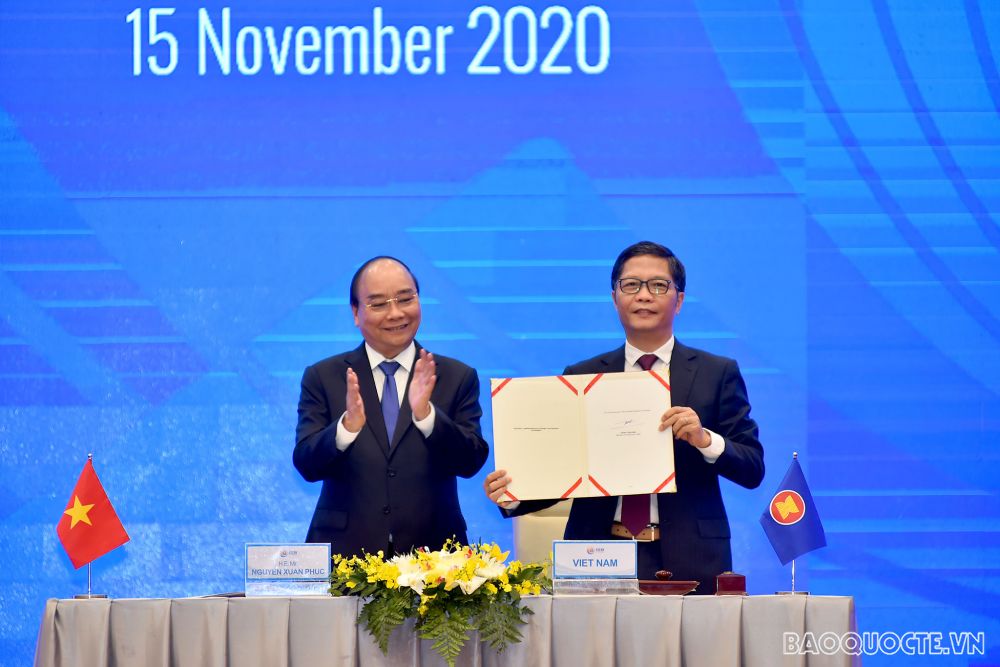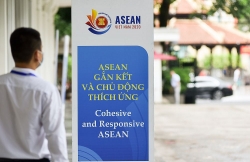
RCEP Agreement signed after years of talks
Latest
| TIN LIÊN QUAN | |
| RCEP countries make "significant" progress in trade talks | |
| RoK expert highlights RCEP’s role in dealing with protectionism | |
RCEP involves 10 ASEAN member nations - Brunei, Cambodia, Indonesia, Laos, Malaysia, Myanmar, the Philippines, Singapore, Thailand, and Viet Nam, and the bloc’s partners - Australia, China, Japan, the Republic of Korea (RoK) and New Zealand. Together, they account for around 30 percent of the globe's gross domestic product (GDP) and 30 percent of the world's population.
The agreement is expected to create the world’s largest free trade area and numerous new supply chains, and make significant contributions to regional economic recovery post-COVID-19.
 |
| Prime Minister Nguyen Xuan Phuc and Minister of Industry and Trade Tran Tuan Anh at the Ceremony. (Photo: Tuan Anh) |
Speaking at the signing ceremony which was held virtually, Vietnamese Prime Minister Nguyen Xuan Phuc said the new cooperation framework of the RCEP will contribute to accelerating the building of the ASEAN Economic Community 2025, helping ASEAN become a dynamic, strong partner that works for common prosperity.
The signing of the deal is the pride and great achievement of the ASEAN countries and partners in laying a foundation for a new, comprehensive, long-term cooperation period, bringing benefits to all countries in the region.
The PM expressed his hope that the agreement will soon be ratified by the countries and put into place in the time ahead, contributing to post-pandemic economic recovery and bringing prosperity to people and businesses of all the member countries.
In an interview with the Vietnam News Agency (VNA) on the sidelines of the signing ceremony, Minister of Industry and Trade Tran Tuan Anh, who inked the pact on behalf of Viet Nam, described the signing of the deal as a milestone in the economic integration of Viet Nam and other participating countries.
With commitments to opening markets for goods, services and investment, and the harmonisation of the rules of product origin between the countries, as well as trade facilitation measures, the agreement will create opportunities to develop new supply chains in the region.
The pact will help to establish stable, long-term export markets for Viet Nam and other ASEAN countries, the minister said.
Notably, with new cooperation frameworks in the RCEP and other free trade agreements, the ASEAN countries will become trust-worthy destinations for international investors, he stressed.
The conclusion of the RCEP talks and the signing also play a role in promoting ASEAN’s centrality in shaping the regional architecture, the minister added.

| ASEAN economic power in the new normal ASEAN is increasingly playing a central role in global affairs while showcasing its proactive adaptation to regional and international challenges, including the unprecedented economic adversity ... |
| RCEP countries make "significant" progress in trade talks Ministers from 15 Asia-Pacific countries negotiating the Regional Comprehensive Economic Partnership (RCEP) agreement on August 27 said they have made "significant progress" toward the signing ... |

| Youths confident in Vietnam’s future development: Survey Respondents generally have positive perceptions of Vietnam and are optimistic about the future of their country, according to the British Council’s Next Generation Vietnam survey, ... |

























